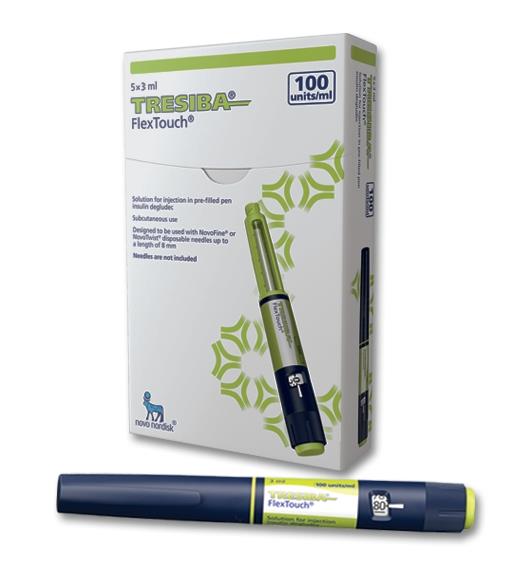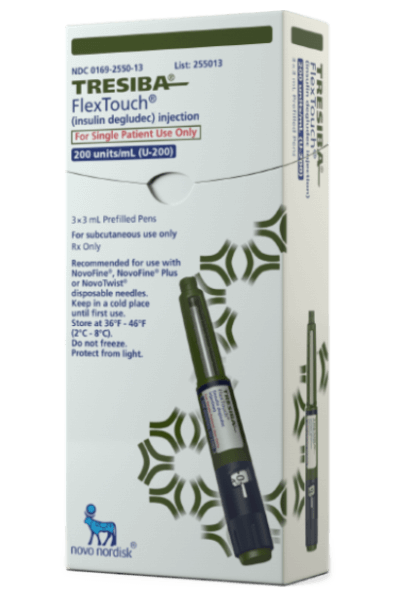- Home
- Diabetic Insulin
- Diabetic Test Strips
- Insulin Pen Needles
- 1/2″ 12.7mm Insulin Pen Needles
- 1/4″ 6mm Insulin Pen Needles
- 29 Gauge Insulin Pen Needle
- 3/16″ 5mm Insulin Pen Needles
- 30 Gauge Insulin Pen Needle
- 31 Gauge Insulin Pen Needle
- 32 Gauge Insulin Pen Needle
- 33 Gauge Insulin Pen Needle
- 5/16″ 8mm Insulin Pen Needles
- 5/32″ 4mm Insulin Pen Needles
- BD Insulin Pen Needles
- Easy Touch Insulin Pen Needle
- Gnp Insulin Pen Needle
- NovoFine Insulin Pen Needle
- Insulin Syringes
- Insulin Syringes Brand
- Glucometer Blood Glucose Meter
- Glucose
- Diabetes Control Solutions
- Diabetes Accessories
Tresiba FlexTouch Pens 100 Units/mL
CAD $202.64 – CAD $3,240.88
Description
Tresiba Flextouch Pens (100 units/mL) Pen is a pre-filled disposable pen that contains 300 units of insulin.
Tresiba is long-acting basal insulin called insulin degludec. It is used to treat diabetes mellitus in adults, adolescents, and children aged one year and above. Tresiba helps your body reduce your blood sugar level. It is used for once-daily dosing.
On occasions when you cannot follow your regular dosing schedule, you can change the dosing time because Tresiba has a long blood sugar-lowering effect. Tresiba can be used with meal-related rapid-acting insulin products.
In type 2 diabetes mellitus, Tresiba may be used with tablets for diabetes or injectable antidiabetic medicines other than insulin.
Insulin degludec replaces the insulin the body typically produces. It acts longer than regular insulin (similar to insulin detemir) and provides a low steady release throughout the day. It helps blood glucose get into the body’s cells to be used as energy.
Insulin degludec can be used along with other diabetes drugs, including a shorter-acting insulin product.
Tresiba FlexTouch Pens last eight weeks, once opened, are also available in 200 units/ml.
Warning and Precautions
Never extract insulin from a Tresiba FlexTouch pen using a syringe to avoid dosing errors or potential overdose.
Let your doctor know if you have any important notes about your medical history, especially if you have/had liver or kidney disease. Inform your doctor if you have any allergies to insulin degludec or any of its ingredients.
Blood sugar levels may also be affected by stress, surgery, injury, or fever. Please inform your doctor as they may choose to make adjustments to your insulin treatment.
Before going into surgery, inform your doctor or dentist if you are currently taking insulin. This should also include other prescriptions, OTC medications, herbal supplements, and vitamins.
If patients miss a dose, they should continue their insulin treatment as usual. Pediatric patients should consult their doctor if they miss a dose and closely monitor their blood glucose levels.
If you are traveling across time zones, you may require changing your insulin schedule. When traveling, be sure to bring extra insulin & diabetes supplies with you.
Never share Tresiba pens, needles, or syringes with others, even if the needle has been changed, as it can lead to spreading infection or transmission of blood-borne pathogens.
Any changes to your insulin regimen should be done under medical supervision. Your doctor may choose to make dosage adjustments to anti-diabetic or other prescription medications you are currently taking.
Do not use this medication, especially if you currently have any liver or kidney disease.
Do not use Tresiba if you are experiencing hypoglycemia (low blood sugar levels).
Using Tresiba Flextouch
Before injecting insulin, make sure you are using the correct medication.
Review all patients’ information and guides available that your pharmacist provides to familiarize yourself with your prescription.
Inspect your insulin does not have particles or discoloration before use. If either is present, do not use it. Insulin should appear clear and colorless.
Before administering Tresiba, clean the area for injection with a cotton swab and alcohol.
Rotate injection sites to avoid developing problems such as lipodystrophy.
Tresiba can be injected in the upper thigh, upper arm, or stomach area. Do not inject into a muscle or vein as this may cause hypoglycemia.
Do not inject into skin that is swollen, red, or itchy.
Do not mix with other insulin or use an infusion pump.
Ensure you fill your pen with the correct cartridges, as there are different types of Flextouch pens in the market (such as Fiasp).
Side Effects of Tresiba
Like all medicines, this medicine can cause side effects, although not everybody gets them.
Hypoglycemia (too low blood sugar) may occur very commonly with insulin treatment (may affect more than 1 in 10 people). It can be severe. If your blood sugar level falls too much, you may become unconscious. Severe hypoglycemia may cause brain damage and may be life-threatening. If you have symptoms of low blood sugar, take action to increase your blood sugar level immediately.
If you inject insulin at the same place, the fatty tissue may shrink (lipoatrophy) or thicken (lipohypertrophy) (may affect up to 1 in 100 people). Lumps under the skin may also be caused by a build-up of a protein called amyloid (cutaneous amyloidosis; how often this occurs is unknown). The insulin may not work very well if you inject it into a lumpy, shrunken, or thickened area. Change the injection site with each injection to help prevent these skin changes.
You may receive Local reactions at the place you inject yourself may occur. The signs may include pain, redness, hives, swelling, and itching. The responses usually disappear after a few days. See your doctor if they do not disappear after a few weeks. Stop using Tresiba and see a doctor straight away if the reactions become serious.
Tresiba may cause swelling around your joints. When you first start using your medicine, your body may keep more water than it should. This causes swelling around your ankles and other joints. This is usually only short-lasting.
Allergic Reactions
Some people may have an allergic reaction to Tresiba. Symptoms of a mild allergic reaction can include rashes, itchiness and flushing (warmth, swelling, redness, or discoloration in your skin).
A more severe allergic reaction is rare but possible. Symptoms of a severe allergic reaction can include swelling under your skin, typically in your eyelids, lips, hands, or feet. They can also include swelling of your tongue, mouth, or throat, which can cause trouble breathing.
Call your doctor right away if you have an allergic reaction to Tresiba. But if you think you’re having a medical emergency, call 911 or your local emergency number.
Drug Interactions
Tell your doctor, pharmacist, or nurse if you have recently taken or might take any other medicines. Some medicines affect your blood sugar level; this may mean your insulin dose has to be changed.
Your blood sugar level may fall (hypoglycemia) if you take other medicines for diabetes (oral and injectable), sulfonamides (for infections), anabolic steroids, such as testosterone, beta-blockers (for high blood pressure), acetylsalicylic acid (and other salicylates), monoamine oxidase (MAO) inhibitors (for depression) and angiotensin converting enzyme (ACE) inhibitors (for some heart problems or high blood pressure).
Your blood sugar level may rise (hyperglycemia) if you take danazol (for endometriosis), oral contraceptives (birth control pills), thyroid hormones (for thyroid problems), growth hormone (for growth hormone deficiency), glucocorticoids (such as ‘cortisone’, for inflammation), sympathomimetics (such as epinephrine/adrenaline), salbutamol or terbutaline (for asthma), thiazides (for high blood pressure or if your body keeps too much water), Octreotide and lanreotide and Pioglitazone.
Some patients with long-standing type 2 diabetes mellitus and heart disease or previous stroke who were treated with pioglitazone and insulin experienced the development of heart failure. Inform your doctor immediately if you experience signs of heart failure such as unusual shortness of breath, rapid increase in weight, or localized swelling (edema).
If any of the above applies to you (or you are unsure), talk to your doctor, pharmacist, or nurse.
Pregnancy
It is not known if Tresiba affects the baby in pregnancy or during breastfeeding. If you are pregnant or breastfeeding, think you may be pregnant, or are planning to have a baby, ask your doctor or pharmacist for advice before taking this medicine. Your insulin dose may need to be changed during pregnancy and after delivery. Careful control of your diabetes is needed in pregnancy. Avoiding too low blood sugar (hypoglycemia) is particularly important for the health of your baby.
Storage
It is recommended to refrigerate all unopened insulin medication. Unopened Tresiba can also be stored at room temperature however should be thrown away after 56 days.
Storing Tresiba (in-use):
Can be kept at room temperature (below 86°F) or refrigerated (36°F to 46°F) for eight weeks (56 days).
It should be stored away from direct sunlight and heat.
Do not freeze or use the insulin that has been frozen.
Keep the medication away from children and pets.
Do not dispose of medication in household trash or wastewater (down sink or toilet).
Speak to your pharmacist about how to properly dispose of medication.
| Quantity | 5 Pens, 10 Pens, 15 Pens, 20 Pens |
|---|
Diabetic Test Strips
Insulin Pen Needles
- Home
- Diabetic Insulin
- Diabetic Test Strips
- Insulin Pen Needles
- 1/2″ 12.7mm Insulin Pen Needles
- 1/4″ 6mm Insulin Pen Needles
- 29 Gauge Insulin Pen Needle
- 3/16″ 5mm Insulin Pen Needles
- 30 Gauge Insulin Pen Needle
- 31 Gauge Insulin Pen Needle
- 32 Gauge Insulin Pen Needle
- 33 Gauge Insulin Pen Needle
- 5/16″ 8mm Insulin Pen Needles
- 5/32″ 4mm Insulin Pen Needles
- BD Insulin Pen Needles
- Easy Touch Insulin Pen Needle
- Gnp Insulin Pen Needle
- NovoFine Insulin Pen Needle
- Insulin Syringes
- Insulin Syringes Brand
- Glucometer Blood Glucose Meter
- Glucose
- Diabetes Control Solutions
- Diabetes Accessories


